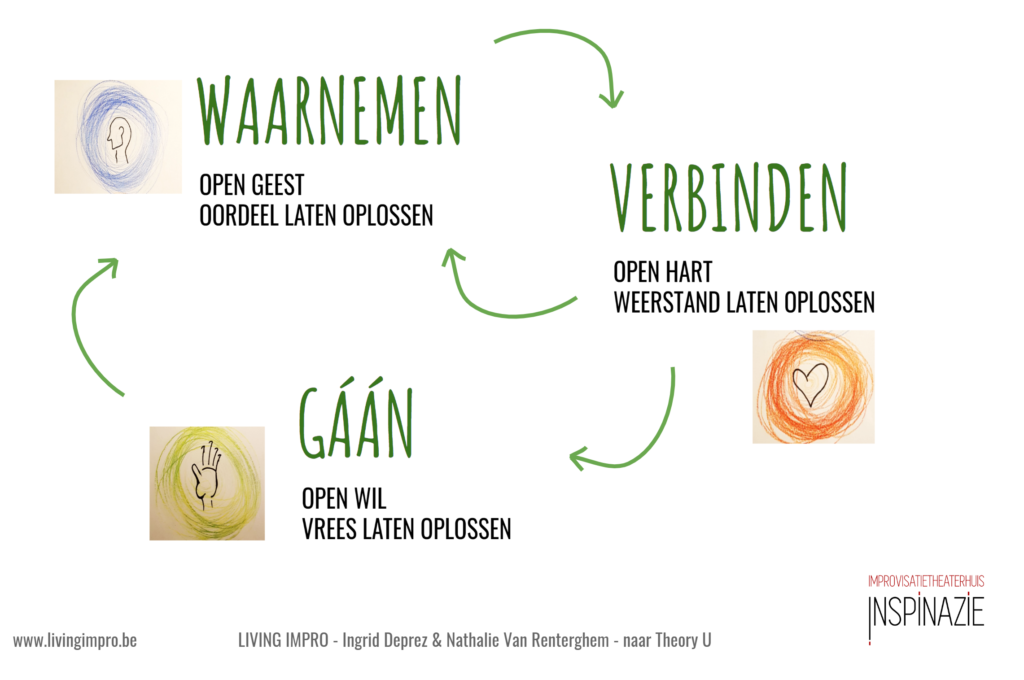Improvisation training is not therapy, let that be clear. That said, it can have a healing effect, some therapists use improvisation exercises in their work, and we regularly have participants in courses who were referred by their therapist.
In the ten days of mental health and resilience we like to bring this to your attention. By telling you that this week we are guests in St. Camillus where Bierbeek's young people come to visit and learn about the workings of the institution. They will also join us in a workshop on listening ears, connecting hearts and playfulness, which we call upon them to preserve and cherish throughout their lives.
Or by drawing attention on our open offerwhere you can discover for yourself the physically and mentally beneficial effects of applied improvisation training. In their work with Living Impro incidentally, on the strong link between improvisation and gestalt therapy (Ingrid is a gestalt therapist).
And by republishing this wonderful blog by systems therapist Kevin Pieters. Ten years old, still burningly relevant.
Improvisation and therapy

Kevin Pieters (°1980) is a systemic therapist and lecturer, as well as being fascinated by improvisation.
And we are happy to have him share his findings as a guest blogger. (This article was first published in 2012, on our previous website.)
What are we working on?
Relief is not always solving problems, but often creating a context of new meanings, meaning and relationships. Counseling is being searching in motion. Perhaps that is what I have been strongly engaged in this past year. And then perhaps not specifically focused on helping or therapy. But mostly looking for nourishment to do what I have been doing in the IPRR (Institute for Psychotherapeutic Relationships and Reflections) am immersed in, to hold on to.
Because, this brings me to the more philosophical question: What on earth are we doing (for heaven's sake)?
Is there still room for it:
-unmeeting? Not having to, being allowed to choose, having free space
-inspiration? The third element, improvisation, creativity
-the non-socially desirable?
Or are we heading toward a relief effort that:
-deep personalized ?
-protocolized?
-controlled?
I don't have a beatific answer to this. Only that I make and hopefully can continue to make the choice for myself to take the space for encounter, creativity and inspiration. To stand in front of it and say that this is the essence of my work. Or at least how I see my work. Not getting caught up in a power struggle over whose truth is now the most truthful. But just from a basic sense that what I have to offer can also be valuable.
It is somewhat out of this movement that I came into contact with improvisation. Improvisation as a breeding ground to keep looking for that space within my current work. The space of encounter, of co-creation, of things that cannot be controlled, of enjoyment, of playfulness, of daring, of....yourself.
Concepts of improvisation
(Source Interactive Improv)
1 - Relational action
Improvisation hinges on a collaborative attitude based on mutual trust, acceptance and shared meaning.
Relationships that are important in impro are the player-player relationship, the player-spectator relationship and re relationship of the "self" of the players. All three relationships are integral to the creation of a scene. Improvisation is not merely the exchange of information; it is a dynamic process.
To enable this relational activity, one of the methods used to do so is the "Yes, and..." approach. "Yes, and..." means that each player is always in acceptance and support of what the other brings to the scene. Maw, suggestions offered by the other are accepted (Yes) and at the same time further developed (and...)
"Yes, and..." is a basic attitude that every improviser needs in order to put down scenes. It is the fundamental choice to accept the here and now and move forward with it. The "Yes, and...." Does not mean, however, that there is no room for conflict, tension and disagreement.
Ultimately, it is the relational dynamics between the players (and the exploration of that which is offered) that makes a scene interesting.
Besides acceptance, trust is crucial. "The best way for an improviser to look good, is by making his fellow player look good." Confidence has to do with self-confidence, trust in the other person. It provides the necessary spontaneity and minimizes the inner critic. Having confidence goes beyond that, it invites you to let go of the need to control the situation. It challenges players to go with what the here and now brings and it forces you to let go of your (dominant) ideas.
The added value in this attitude is the fact that mistakes cannot be made or that "mistakes" are included in the totality of all actions and therefore may just begin to have meaning. Mistakes are thus, as it were, constructions of our inner critic and do not actually have anything to do with the event itself.
2 - Contextual embedding
A basic attitude of being in the here and now, in full awareness. The world around you, what you smell, see, feel, taste. Awareness that causes you to be sensitive to the context around you and to amplify your sensations. Not so much to magnify everything you see, but just to become small and very specific awareness. (e.g., change in breathing, tone,...) The plan to be busy with the next scene in impro, stands in the way of being in the here and now. It is again from the relational dynamics and the trust in your fellow player that you can continue to focus on what presents itself. A step further is to respond from that strong presence in the context with whatever comes to mind (respond authentically). (respond authentically) Often ideas and reactions come without any logical rational explanation and explanations can be staged after the fact. (preverbal vs. the rational/verbal
3 - Narrative compositions
"Yes, and...", as discussed above does not necessarily create a storyline. The "Yes, and..." mainly allows for progression in a story, for not getting roadblocks in a story. To arrive at a story, impro needs a narrative structure. A story where difference and common ground arise between the two players. A game with meaning. An interplay and counterplay (cfr. Whitaker). When does a story emerge? When each player knows how to define his character as a 3 dimensional character. What are the character's motivations, desires and emotions and make them interpersonal. It is these elements that make stories interesting. About storytelling: Improvisation does not invent new stories. No story has been told that hasn't already been told! The content of the stories is secondary. What is central is the relational dynamics between the players and the creation of meaning.
Relational dynamics are fueled by emotions, commitment to each other, listening,... An important component for narrative is "status" within relational dynamics. In any human relationship, in any form of communication, power plays a role. In impro, that power relationship is defined as status. A high status and a low status. Rigidity in interaction occurs when people cannot or will not change status. In improv methodology, participants will be constantly invited to use their game status not as a means of control but as a means of development. Within psychology, think of Leary's rose as looking at interpersonal communication from the status high, low and together, against. Look at yourself as a counselor ... what do you do when your client is in high status? Can you play with your own status or do you engage in the "power struggle" all the time?
"True Improvisation is a dialogue between people...a dialogue of being."
Paul Sils
Summary (Van Renterghem).
Basis for impro is thus not in techniques, but rather in a fundamental basic attitude, and this is inspiring for all forms of co-creation:
- Trust the other, assume the best intention of the other and put yourself at the service of the story that presents itself instead of trying to control it.
- Be genuinely interested in the other person's view, marveling at what arises.
- Interact playfully and positively.
Improvisation and psychotherapy
The links I make between impro and psychotherapy should be listened to with respect for their uniqueness. I am not advocating here that improvisation be included in every therapy session from now on. Improvisation and therapy do not share the same context and intentions. Improvisation can be a source of nourishment for any therapist who values the "self of the therapist."
To say something about the link between impro and therapy, I like to refer to Virginia Satir. Position of Satir: A person who has learned to value himself will be able to communicate congruently and clearly and solve all problems with respect for the freedom for every other person. Therapy is seen in this concept as an opportunity, to help people develop a stable self-esteem, so that they dare to express their true yeses and true no's to speak out, either saying what they really think and want and not saying what they think is expected of them.
In her book People Making, Satir talked about 5 freedoms nl..:
- The freedom to see and hear what is really there in a moment. As opposed to what should be, has been or will be.
- The freedom to express what I really feel and think. And not that which is expected of me or that I think is expected of me.
- The freedom to allow my feelings. And not trading those feelings for others.(cfr.emotional quadrant.... What can I allow, what emotions are foreign to me, uncomfortable,...)
- The freedom to ask for what I need. And not always waiting for permission.
- The freedom to take risks with personal responsibility. Instead of just being on the safe side and not daring to try anything new.
Decision
Through drama and theater, both inner and interpersonal processes can be translated, potentially restoring movement where there was stasis. A spring can spring up in the void, a silence can be given a voice and chaos finds structure.
The basic attitudes of impro were so recognizable to myself, but they were more than that. While practicing impro workshops, I really had to become very aware of those particular attitudes, of my blockages, of my tendency to control or dominate. Even though within your counseling context you have peer review and supervision and you name it...it was in the context of impro-theater that there was a renewed awareness of some obvious basic attitudes. After all, isn't therapy/life also always a bit of improvisation? In any case, impro helped give me that nourishment and actually see reaffirmation in the power of that which has been emphasized throughout 4-year IPRR. The therapist's self, the de-meeting and creative space of meaning-making and co-creation. . ...

